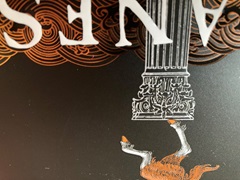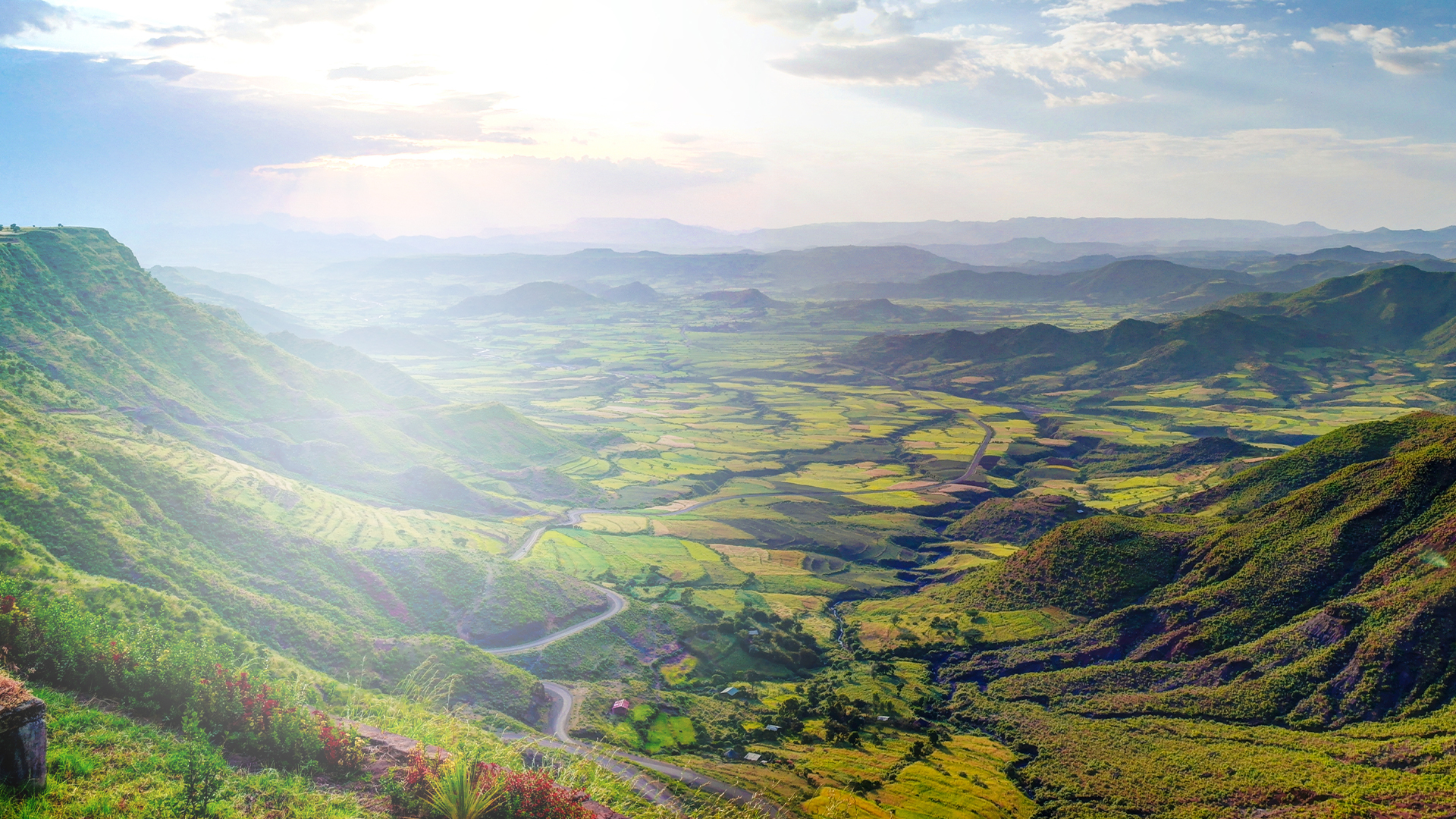
Two books for 2022
Piranesi. The Promise. Entangled Life. Destiny Disrupted | Choose two | Issue 20 | 2022


THE GEOLOGIST
The Afar desert
Is said to be the hottest place on Earth
The Afar Rift
Is said to be one of the few places on Earth
Where we can witness plate divergence
How does the hot, molten rock migrate and evolve
As it rises towards the surface?
How does the surface of the Earth react
As it is thinned and split apart?
How is the magma intruded into this thin crust
To form the beginnings of a new ocean?
The continental crust is cracking open
The horn of Africa will fall away
Creating an island in the Indian Ocean
Splitting the African continent in two
The sea will flood in
All this will take about ten million years.
THE CORRESPONDENT
Tigray, the cracked desolate landscape of the far north
The site of a once Biblical famine
The closest thing to hell on earth
Now, in a valley, across the plains, summoned by horns
They use picks shovels iron bars bare hands to tame the desert
They build terraces
They force water to seep into the soil
In flash flood canyons they build dams
They terrace entire mountains
Community leaders barking orders into mobile phones
Now, families reap three harvests a year
Now, malachite kingfishers live in the desert
Now, people want electricity
Not godforsaken, not now, not then.
THE TREKKER
One of the great, extraordinary landscapes of the world
High uplands with tremendous ravines
That plummet for thousands of feet
You’re compelled to stay in designated campsites
This did not appeal to the Johnnie Walkers one iota
We just want to trek and camp on our own.
We encountered rain, hail and snow
Which in November is considered to be extraordinary
And very unlucky.
THE LAWYER
Addis is a city of skyscrapers, surrounded by poverty
Three, four, even five dual lane roads
Crossing each other at different angles
No traffic lights, no stop signs
All the cars driving to the intersection at the same time
Yet the cars continue to move
I simply don’t understand it
I can see no logical structure.
THE COMMENTATOR
Crazy grey mountains
Huge blue lakes flashing like mirrors in the sun
Vast rigid squares of plastic sheeting
Subsistence farming
A step-by-step approach, communal
Dependent on rain, prayers and aid
Flower farms
Yielding more than fifty per cent of export earnings
Dependent on complex chains of production and transport
The water table is going down
Everyone says
The priority now is water
How will the flower farm coexist with agriculture
That is done by hand
And dependent on rain?
THE COOPERATIVE
When we get more money we rent more land
And we send our children to school
Investing in land is safe
A house is an asset
And from cattle you get money for milk.
THE WOMEN’S COOPERATIVE
We started to discuss common issues
We started to invest in sheep, goats and cows
We started to learn to read and write
Our life is not comparable with the old days
It is the difference between earth and sky
Some men had three or four wives
The oldest was abandoned
And had to go on working
Female genital mutilation was common
Now, it is almost stopped
There is still dominance of men
But polygamy is rare, now.
THE AID WORKER
Every village had a church, with trees around it
It was 1980 and I was 24
The first foreigner to go into rebel-held areas of northern Ethiopia
I went under the protection of the Tigray People’s Liberation Front
And travelled with foot soldiers for three months
I walked into one village and they ran away from me
They had never seen a white person
People were running up the hillside to get away
They lived in circular houses with straw rooftops
Where there was no electricity they used oil lamps
They lived off the land, using oxen and wooden ploughs
And walked long distances to get water from the streams
I hooked up with the TPLF band at one point
I played to a crowd of three thousand in an open-air auditorium
They pressed money into my clothes to show appreciation
The land hadn’t seen rain for a long time.
THE TEACHER
Pizza places and ice cream parlours
Locals sipping on macchiato
Injera, huge sour pancakes made from teff wheat
Eating with their hands, feeding each other
The ancient sound of music, spellbinding
High emotive pitches, beautiful Ethiopian women
The talk of young men in a chat house
Reminiscing over the glorious past
Water and electricity coming and going
The enormous dust bowl that is Addis
Ethiopia was never colonised by European settlers
Everyone in Addis knows this.
THE AID WORKER
I led a documentary film crew into Ethiopia in 1984
Media reporting, Band Aid, Live Aid
I was a guest at the independence celebrations in 1991
I went back in 1994 and had dinner with Meles Zenawi
All he wanted to talk about was the old days
In 1991, the story goes
Donors with embassies in Addis started to flee
So Meles Zenawi went to the airport
He stood in the airport giving a speech
They stood there with their bags ready to leave
Ready to get onto the plane
Only twenty per cent of them actually left
The other eighty per cent turned around, came back
He was that persuasive
He was that good
He was an extremely clever guy
Tigrayans, Amharas and Oromos
They have dominated politics in the country since forever
Since the time of Solomon.
THE TREKKER
Most of Ethiopia is at altitude
The border with Somalia is extremely low-lying
It may be the hottest place on Earth
The people are pretty poor
But they’re a nice, open people
Very proud of their country
If you go to the former Imperial palace
You’ll see a picture of Haile Selassie and his retinue
Accompanied by James Bagge’s father
They have no colonial history to talk of
The Italians were only there for a few years
What they did do was leave some quite good architecture behind
Addis Ababa is quite a nice city
It’s at height so you get a beautiful clear sky
We loved it.
THE COMMENTATOR
Addis used to feel like a timeless city
People walked slowly as if on a long stroll
Now, they march the streets
With speed and urgency
Hammering, grinding and showers
Of glittering acetylene sparks
Proclaim the arrival of armies of Chinese workers
And the rise of mighty steel and glass constructions.
THE LAWYER
Ethiopia is slow to move
It has to step up the game
Keep up with the pace of change
It’s insular
It’s over regulated
It could be a powerhouse in the region
A global player
There are hydropower and geothermal resources
There is the consumer base that consumer-related industries seek
There are natural water reserves—the lakes
There is agriculture, flowers, fruit, vegetables
There are secondary markets outside of resources
There is telecoms, technology coming onstream
Kenya, Tanzania, Uganda, Burundi, Rwanda
Freedom of movement of people
Freedom of movement of jobs
African countries are almost leapfrogging ahead
Ethiopia is slow to move.
THE AID WORKER
Sylvia Pankhurst is buried in Ethiopia
The ashes of Bob Marley were brought to Ethiopia
And tourists flock to the rock churches at Lalibela
It is true
There is a church that is guarded by priests
They won’t let anybody in
Nobody at all
Under any circumstances
And that is supposedly the site of the Holy Grail.
THE COMMENTATOR
The monastery at Debre Damo has stood for 900 years
High among the vast Tigrayan mountains
There are carvings of birds and animals
There are deep sunken pools
Dug over the centuries by the monks
To hold the rain water
Ethiopia is old
Ask any passing Ethiopian
What is the story of Ethiopia:
It begins with the visit of the Queen of Sheba
To King Solomon
Who tricked her into sleeping with him
And their child was King Menelik I
The founder of Ethiopia
And King Solomon, as a parting gift,
Gave the Ark of the Covenant to the Queen
You will be told this as simply
As if it were yesterday’s weather.
More than three million years ago
Our hole in the ground
The Afar Rift.
Ethiopia
With thanks to: British Geological Survey; Chris Haslam, BBC Radio 4, From Our Own Correspondent, 2015; Owen Jonathan, the Johnnie Walkers hiking group; Rob Otty; Richard Dowden, Royal African Society, RAS blog 2014, 2012, African Arguments 2013; Jon Bennett, Oxford Development Consultants; Nick Parish
© Norton Rose Fulbright LLP 2025